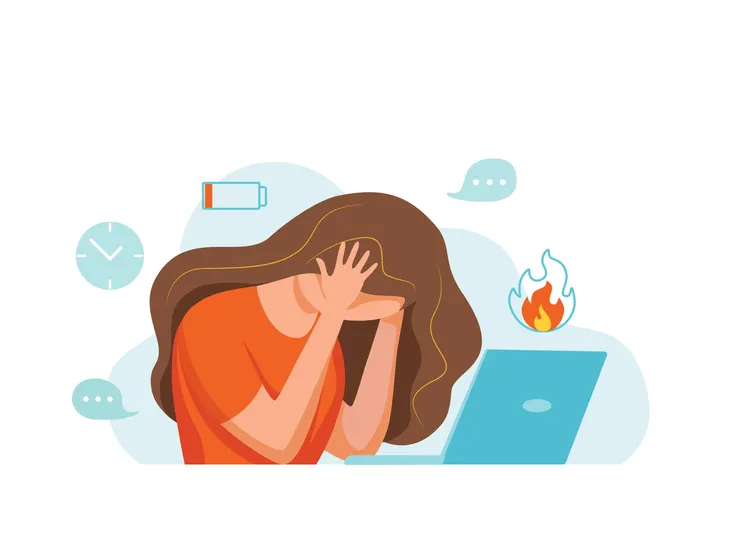Whether it’s working, helping others, or taking care of family — our lives are busy and most people are not taking enough time to step back and rest. When we don’t take the time to rest and just keep piling on, that’s when burnout happens. It’s a state of mental and physical exhaustion that can zap the joy out of our lives.
Those who have a strong drive for success, a passion for their work, or set perfectionist standards for themselves are the most susceptible and hardest hit. Couple that with a lack of attention to self-care and we soon find ourselves without the energy or interest to keep up the pace. If left unchecked, burnout can become a serious mental health issue. Here’s a look at what burnout is, as well as how to recognize and avoid it…
What is Burnout?
The term burnout is relatively new. It was coined back in 1974 by Herbert Freudenberger in his book, Burnout: The High cost of High Achievement. He defined burnout as “the extinction of motivation or incentive, especially where one’s devotion to a cause or relationship fails to produce the desired results.”
WebMD defines it as a form of exhaustion or feeling “constantly swamped.” It occurs from excessive and prolonged emotional, mental, and physical stress. Most of the time it’s related to work. It occurs when people become overwhelmed with the duties of everyday life. While it’s not a medical diagnosis, says WebMD, it can affect both physical and mental health if it goes untreated.
Burnout vs. Stress
We all experience stress. Some more than others depending on our lifestyle and work environment. However, few people reach the point of being burnt out. Helpguide.org defines stress as involving too much of something. That could be too many pressures that are demanding too much from a person. While stress is definitely not nice, a person will likely still feel somewhat in control — just overwhelmed.
Burnout is when a person surpasses feeling too much and is now at the point of not enough. “Being burned out means feeling empty and mentally exhausted, devoid of motivation, and beyond caring,” writes the source. When someone is burnt out they are past the point of feeling stressed and now feeling hopeless. Helpguide.org draws the comparison that stress causes someone to feel like they are drowning in responsibilities while burnout gives the sense of feeling dried up. People often notice when they are stressed, whereas burnout often goes undetected.
Types of Burnout
There are three main types of burnout, each with their own cause. The first type is overload burnout, says WebMD. This occurs when we work so hard and become so focused on success in the workplace that we sacrifice our work and personal life.
The next type of burnout is under-challenged burnout. People who fall victim to this type of burnout are often under-appreciated and bored in their job. You might be craving new learning opportunities or stuck in a position with little to no professional growth. “If you feel under-challenged, you may distance yourself from your job, become cynical, and avoid responsibilities,” writes WebMD.
The last type that WebMD lists is neglect burnout which is when a person feels helpless. “If things aren’t going right, you may believe you’re incompetent or unable to keep up with your responsibilities,” writes the source. This burnout is closely related to imposter syndrome, when people doubt their skills, talents, and accomplishments.
Signs of Burnout
People often don’t realize they are in a state of burnout until it’s already happened. This is because it’s not something that happens suddenly or even quite clearly. It’s a gradual process that builds overtime, often from stressors stemming from the workplace. The symptoms are subtle at first, says WebMD, and then worsen as they continue. Eventually, it can lead to a breakdown.
Another reason it often goes unnoticed is because the signs are similar to stress. The three big symptoms are tiredness or exhaustion, a lack enthusiasm or negative feelings at work, and lastly, an inability to perform at work. While it’s often confused with stress, it can lead to depression if it goes untreated. Continue reading for a more in-depth at the symptoms of burnout…
Symptoms of Burnout
Exhaustion
It is one thing to feel fatigued due to a sleepless night or lack of attention to nutrition, but another to be fatigued all the time no matter what we do. We may go to bed early only to wake up tired, and without the energy to keep up during the day. We may find ourselves overwhelmed with the smallest of tasks and begin to do less while calling in sick more.
Although chronic fatigue may slowly creep up on us, it serves as a red light that something’s wrong and needs to change. If we become aware early enough, we can make the necessary changes to our schedules to help prevention complete burnout in the long run.
Reduced Performance
For those who have ever tried to focus on a task only to start thinking of something else, the lack of concentration can be quite frustrating. In fact, the inability to focus on tasks for long periods of time can be a symptom of stress or burnout. This can result in missed deadlines at work, inability to achieve important goals, or procrastination.
Should this become an issue, there are many exercises one can do to enhance concentration and overcome the lack of focus. Some simple suggestions may be turning off all other distractions such as email or divide a large task into smaller ones; taking it one step at a time.
Frequently Sick
Burnout can have a devastating effect on our physical health. From muscle aches and back pain to gastrointestinal problems and weight fluctuations, burnout can not only cause pain and discomfort, but lower our immune system. Catching one cold or flu after the other is a sure sign our immune system is struggling to keep up.
Unfortunately, if burnout gets to this stage, the only thing we can do is stop (before our body does). Reducing our workload and the demands placed upon us will be tough, but if we don’t attend to the physical symptoms, we will be inviting more serious health issues down the road. Saying “no” more often, taking time outs, getting enough sleep, and practicing meditation or relaxation techniques are great ways to reverse this nasty effect of burnout.
Irritable
We don’t have to search too long on social media before hitting a few clips of angry people. Examples of road rage and other public displays of anger are everywhere. Interestingly, anger is a secondary emotion and serves as a signal to us that something else is wrong. Anger can result from feelings of sadness, fear, worry, and other overwhelming emotions.
By being in a state of burnout, the experience of such feelings may lead one to default to anger instead of sitting with the primary emotions. The key to working through anger is taking the time to experience the emotions that are causing it. This may mean taking time out of our busy schedule to seek emotional support or allow feelings of sadness to come to the surface. Although it may be uncomfortable in the short term, it may help to prevent further burnout long term.
Alienation From Activities
When we are feeling overwhelmed, stressed, or burnt out, we have a tendency to shut ourselves off and retreat into our own space. Isolation during times of extreme stress can often make a bad situation worse. Feelings of not belonging or rejection can be made worse by cutting ourselves off from the world.
Be wary of any signs of cynicism and frustration toward work and colleagues, warns WebMD. If the burnout stems from work, you’ll likely alienate yourself in the workplace and adopt a very cynical view of your workplace, including co-workers and the environment. People struggling with burnout might also “emotionally distance themselves and begin to feel numb about their work,” writes VeryWellMind.
Emotionally Depleted
Hopelessness is like walking in dark tunnel without a light in the distance to guide us. We don’t know what direction we are going, we don’t know when the light will come on, and we may start feeling like nothing is going to change. Depression and hopelessness are closely linked together and one of the more serious results of burnout.
Once we get to this stage of burnout, it is difficult to get out by ourselves. While it is important to understand our feelings, it is equally important to talk to someone and/or seek the support of a clinical counsellor. In time, through taking a step back from the workload and practicing self-care, hope will return and the light will come on.
How to Prevent Burnout
Invest in Self-Care
When people think of self-care they often picture someone at the spa getting a massage, their nails done, or any kind of over the top pampering. In reality, self care is simply taking care of yourself! It doesn’t have to be glamorous and doesn’t have the come at the expense of work. It’s something we should all be doing in order to maintain good mental and physical health.
There are three extremely important forms of self-care that we should all be doing on a regular basis. The first is eat healthy. We all indulge in unhealthy food now and again, but for the most part try to eat a well balanced diet. The next is to exercise regularly. You don’t have to go sign up for a membership or do a HIIT workout each night. Even just 30 minutes of movement each day is good for our physical health. Lastly, get lots of rest. Sleep “restores well-being and helps protect your health,” writes the Mayo Clinic.
Seek Support
Don’t ever feel guilty or embarrassment about asking for help. People tend to feel a lot of shame about this, especially in the workplace, but they shouldn’t! If your workload is piling up, ask for help! Collaborate with others. Seek out assistance.
If you’re feeling overwhelmed, talk to people you trust whether that’s friends, family members, or co-workers. It might also be a good idea to seek out a therapist to discuss your feelings and get support.















